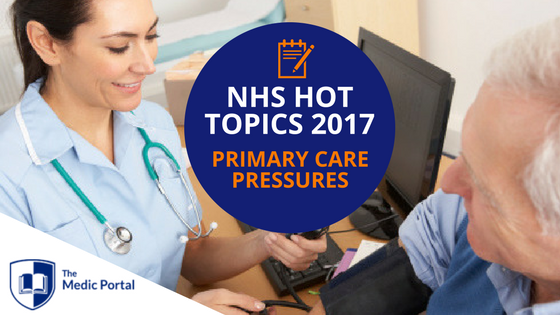
Welcome to our new series on NHS Hot Topics 2017! These blogs will cover one recent piece of medical news from this year in detail.
Want expert interview preparation? Try our one-day Interview Course!
Book the one-day Interview CourseIn a Nutshell
It is well documented that the demand on GP practices is increasing, not least because of increasing patient numbers, but also because of the decrease in the GP recruitment. These healthcare professionals are being increasingly forced to cope with more complex cases, fewer resources and 7 minute consultations.
Current figures suggest that the requirement for 5000 new GPs by 2020 will not be met and the drive to encourage medical students to choose the speciality has had mixed results. GPs are the nation’s “Specialist Generalists”, with over 90% of all contacts with the NHS occurring in general practice (for more information on this, see BMJ’s “General Practice in the UK” Report 2014, available as a PDF online).
They are the foundations from which the rest of the NHS functions on, and as a result, the pressure on these services can be seen as one of the formidable healthcare challenges currently facing us.
What are the Reasons Behind the Pressure on GP Services?
It is well known that the increasingly elderly patient population has a greater chance of developing multiple co-morbidities, and that with the advent of pharmaceuticals, it is now much easier to manage these patients outside the hospital.
Statistics show that the GP patient workload has increased by 16% over the last 7 years. However, this significant increase in out of hospital care is not matched by GP increases. In fact, a report published by the Public Accounts Committee on the “Access to General Practice: Progress Review”, it has been stated that the number of registered GPs actually fell in the most recently published figures, between March and September 2016, from 34,592 staff to 34,495. This has led to reduced opening and increased waiting times.
In addition, the number of older GPs has disproportionately increased. As of the General Medical Council’s most recently published report in 2016, over 39% of GPs are now aged 50 or older. This suggests that a second wave of shortages coming in the next several years as these GPs retire.
Other reasons cited for the pressure on GP services is the greater proportion of GP doctors than any other speciality who work part-time. This is in part due to the standard “9-5” nature of the job, compared to the 12-hour shift patterns experienced at most NHS hospitals.
Policies and Technology Used to Improve GP Functioning
I would like to name and explain a few policies and technological advances that are thought to be paramount in combating this crisis:
August 2017
In reaction to the reduction in UK medical students and junior doctors pursuing a GP career path, NHS England has decided to expand international recruitment in order to meet demand. It aims to recruit around 600 overseas doctors into general practice in 2017-18.
In addition, longer term strategies have been put in place, such as expanding medical school places by 25% over the next several years. The overseas doctors policy has been considered controversial given the recent Brexit referendum.
October 2017
Announcement of Health Secretary Jeremy Hunt’s monetary incentive for those UK GP posts not filled, by offering an additional £20,000 to undertake the post. Whether this has any impact on GP recruitment remains to be seen.
January 2017
Prime Minister Theresa May vows to continue the push started by David Cameron’s announcement in October 2015 that he will deliver a 7-day GP service by 2020. The BMA then rejected this announcement and claimed funding shortages were the cause, not doctors’ laziness.
Other ways that the UK Government has attempted to address shortages includes the process moving some services, such as smoking cessation, sexual health and needle exchange programmes to pharmacy control.
November 2017
It was recently announced on 6th November that a pilot service has been launched for NHS patients, where upon entering symptoms onto a mobile app, you can have video consultations with a GP within 2 hours. This is to be trialled with 3.5 million people across Greater London, but could be the answer to long GP waiting times.
What questions might I be asked at interview?
- What do you think the consequences of the increased demand on GPs services has had on the NHS?
- Give me some reasons behind the increased pressure on primary care services?
- Tell me about recent primary care policies and technologies used to reduce strain on GP practices?
Words: Ben Fox
